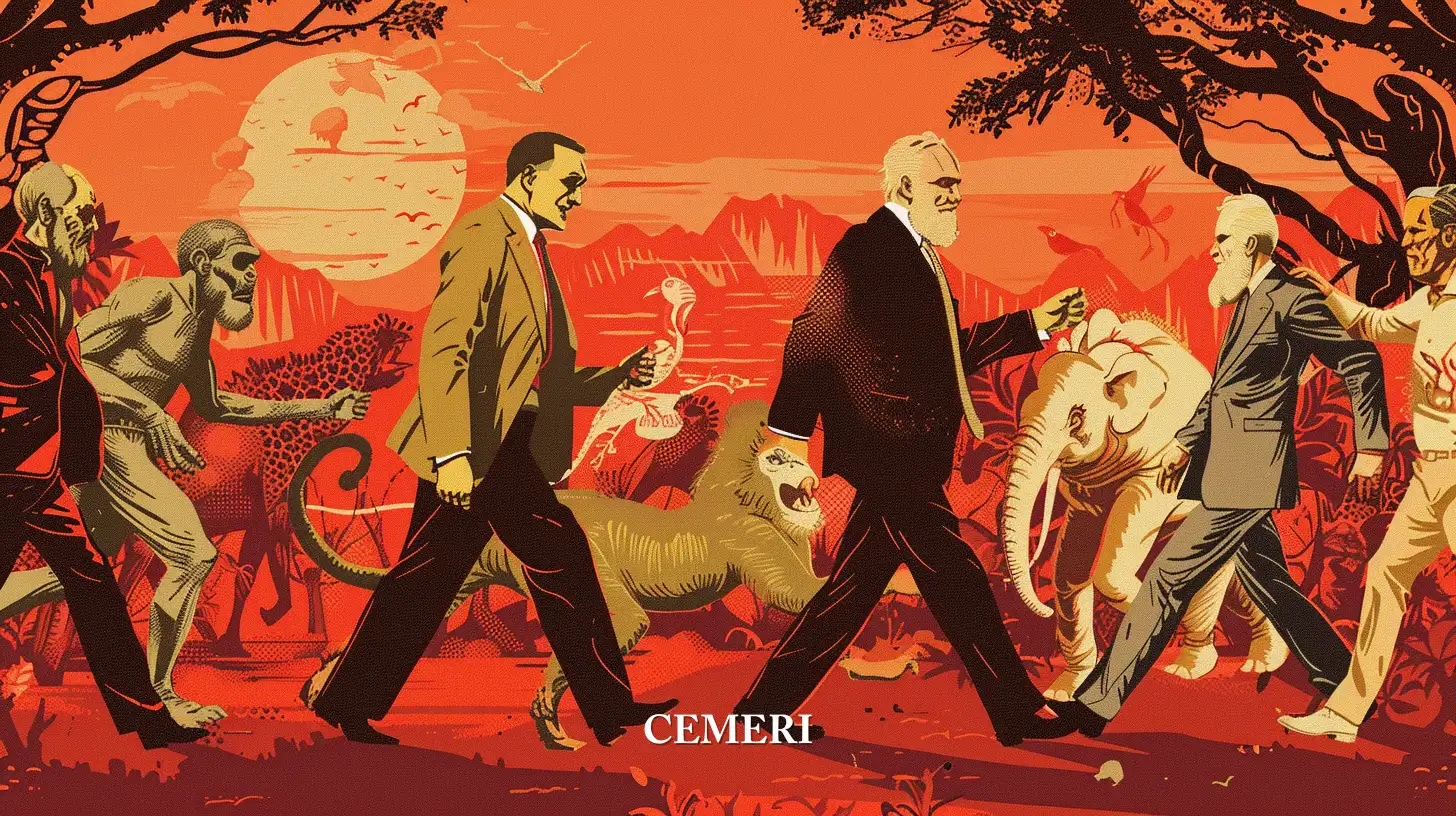Encyclopedia
Marko Alberto Sal Motola
What is Social Darwinism?
- The positive scientific thought of the 19th century consolidated an ideology to justify power structures.

The bases of Darwin's theory:
Charles Robert Darwin was a British natural scientist who made various contributions to evolutionary biology. In his most famous work, The Origin of Species by Means of Natural Selection, or the Conservation of Favored Races in the Struggle for Existence (1859), Darwin theorized the evolution of organisms based on two categories: The struggle for existence (struggle for life) and natural selection or the survival of the fittest*.
The term “struggle for existence” maintains that nature is the scene of inevitable conflicts between organisms, as well as their dependence on specific factors to survive in the environment. The above is exemplified by the fight between animals for food or the need of plants for humidity in the face of drought [1]. To support his argument, Darwin adapted Thomas Malthus's thinking about the “geometric progression of growth,” which forces organisms to compete and destroy each other for the limited resources of the environment [2].
On the other hand, the term “survival of the fittest” refers to the advantages that individuals have over others, regardless of their size, as a decisive factor in survival. On the contrary, any variation harmful to survival tends to disappear thanks to natural selection [3].
However, Darwin distinguished that human beings are capable of making their own selection. In his words: “man selects only for his own good; Nature does it only for the good of the being in its care” [4]; That is, human beings have the ability to manipulate external elements to survive, unlike species that take generations to evolve to adapt to the environment. The above assumes that innate qualities such as reason and intelligence provide human beings with a power of selection different from that of the natural kingdom.
The biological categories mentioned were not limited to changing the paradigms of biological sciences, but had implications for human beings' visions of their reality. This “Darwinian revolution” categorized people as a species “intimately related to the rest of living beings” [5], subject to a hostile environment and a dynamic of survival of the fittest.
Social evolutionism of Herbert Spencer:
Herbert Spencer adapted Darwin's evolutionary categories in his work * First Principles * (1862), in which he describes human groups as organisms governed by the laws of nature and found within an evolutionary framework. Social evolutionism, according to the British thinker, consists of the following: “the passage from an incoherent homogeneity to a coherent heterogeneity, as a result of a dissipation of movement and an integration of matter” [6]. This definition must be analyzed carefully.
Human groups are transformed from an undifferentiated and horizontal population (incoherent homogeneity) to an organization stratified by rulers and governed (coherent heterogeneity). By “severe discipline of nature”, a term used by Spencer in his work Social Statics (1851), the rulers impose themselves and eliminate the “less fit” governed. The social regulatory scheme imposed by the elites dissipates social dynamics and allows an integration of society.
Although these ideas were initially presented as a sociological theory, they served as inspiration for a set of political and social movements supported by the European bourgeoisie, to justify the social structures of domination and the capitalist economic system.
The interpretation of natural selection in the social sphere or “selectionism” began to be applied in human groups, not with an evolutionary purpose like that of the plant or animal world, but to preserve aspects such as culture, individualism, language, ethics, national identity, the economic system and the notion of the State and surviving external threats to society.
Internal and external social Darwinism:
It is possible to classify two types of social Darwinism. On the one hand, the interior manifested itself through the rulers' refusal to carry out reforms with a social vision. As González establishes: “if the struggle for existence and natural selection are an expression of a natural law, trying to help the victims or those harmed is as much as going against nature itself” [7].
Therefore, the State should not intervene in the distribution of benefits or evils in society, but should intervene in defending the winners in the struggle for existence (elites) and preventing the reproduction of the less capable through legal elimination. and systematic. In this vein, Spencer spoke out in favor of eliminating all types of support for vulnerable groups, since he argued that they were symbols of laziness and ignorance, factors contrary to the notion of progress.
On the other hand, external social Darwinism is defined as “a process that is continued by transposing Darwinian ideology from the context of social groups to relations between States” [8]. This perspective arises from a notion of struggle between different societies, as well as the justification of the intervention of certain nations that are considered more intelligent and developed. It should be noted that in his work The Descent of Man (1871), Darwin stated that, although the human races have the same origin, “the American Indians, the blacks and the Europeans differ so much in their intelligence” [9], due to to its adaptation to the environment. The above was interpreted by these movements to justify an intellectual and developmental asymmetry between the races.
The clearest example of external social Darwinism is European imperialism of the last quarter of the 19th century. Among the defenders of this doctrine are the imperialists Cecil Rhodes, who defended British expansionism to perfect the human race; and the writer Rudyard Kipling, who in his poem “The White Man's Burden” (1899) argues that Western man, considered the most developed among races, is part of a divine plan to civilize other societies.
Nazism: Lebensborn and Lebensraum
Adolf Hitler's ideas are another example of the appropriation of social Darwinist selectionism. Nazi ideology emphasized the importance of the individual in terms of “his physical value and the usefulness he can give to society” [10], so it was necessary to use tactics aimed at the elimination of figures such as the family, unions, individuality, religions, knowledge contrary to the ideology of the party and racial extermination.
Specifically, in his essay My Struggle (1925), Hitler highlighted the importance of blood purity and the urgency of gene reproduction between members of the same nation. Furthermore, he raised arguments parallel to those of Spencer regarding the need for a society based on a scheme of domination by the elites: “At the moment when the defeated themselves began to elevate themselves from a cultural point of view, also approaching the conquerors, through language, the vigorous barrier between the lord and the servant collapsed” [11]. Based on the above, only the selectionism of the elites would make the reestablishment of the Aryan order possible.
This selection was not only based on the massive extermination of "inferior races", but also on the promotion of motherhood and eugenics programs Lebensborn, aimed at the reproduction of Aryan genes and the training of girls and boys with the ideology of the party.
On the other hand, from the geopolitical point of view, German foreign policy was based on the doctrine of “living space” (Lebensraum), a concept taken up by Karl Haushofer from the geographical-biological ideas of Robert Kjellen (directly inspired by the Darwin's theory), to justify German expansion in its struggle for survival against the inferior races and the satisfaction of its State vitality [12].
Sexual selection and gender constructs
Darwin added sexual selection as a component of the prevalence of the fittest in the same species: “a struggle between individuals of one sex – usually males – for possession of the other sex” [13]. The conclusion of this fight is the death of the competitor with the least chance of leaving offspring of its own species. Social Darwinism interpreted sexual selection as a justification for avoiding the reproduction of the most vulnerable and maintaining the offspring of the elites.
From another point of view, it is possible to identify how Darwin's ideas have impacted gender constructs and the strengthening of paternalism in social structures. Darwin emphasizes that males and females develop different qualities, since the former have greater interaction with each other due to rivalry, violent or peaceful, to possess the opposite sex: “[Males and females] differ in conformation, color or ornament, these differences “They have been produced mainly by sexual selection, that is, by male individuals that have had successive interactions” [14].
Likewise, in The Descent of Man (1871), Darwin made a distinction between men and women: “Man differs from woman by his size, his muscular strength, his speed, etc., as well as by his intelligence, as It happens between the two sexes of many mammals” [15]. These approaches in the ideology of social Darwinism would be the basis of the domination of the male gender over the female, as well as the consolidation of gender constructs.
In conclusion, more than a sociological theory or a philosophy of history, social Darwinism was consolidated as an ideology that took Darwin's proposals for the benefit of structures of domination. In this situation, it is important to highlight that social Darwinism adapted the fight for the existence and survival of the fittest in metaphysical aspects, with the purpose of preserving the national identity of the bourgeois societies that defend this ideology, justifying interventions and wars, as well as systematically eliminating members of the social structure imposed by the elites.
Sources
[1] Charles Darwin, El origen de las especies (Feedbooks, 1859). https://www.rebelion.org/docs/81666.pdf, p.54
[2] Darwin, Capítulo III: Lucha por la existencia, p.55
[3] Darwin, Capítulo IV: La selección natural o la supervivencia de los más aptos, p.68
[4] Darwin, Capítulo IV: La selección natural o la supervivencia de los más aptos, p.70
[5] Carlos Añón, “Capítulo XVIII: El darwinismo social en la historia de los derechos” en Historia de los derechos fundamentales (Tomo III: Siglo XIX), https://e-archivo.uc3m.es/bitstream/handle/10016/9049/darwinismo_lema_2007.pdf, p.1051
[6] Herbert Spencer, Primeros Principios, (Biblioteca virtual universal, 2003), p.199
[7] Felipe González. El darwinismo social: Espectro de una ideología, (Anuario de filosofía del derecho, No.1, 1984) p.172
[8] González, El darwinismo social, p.173
[9] Charles Darwin, El origen del hombre (fragmentos) (Biblioteca virtual universal, 2007) https://mercaba.org/SANLUIS/Filosofia/autores/Contempor%C3%A1nea/Darwin/Darwin%20Charles%20-%20El%20origen%20del%20hombre%20(fragmentos).PDF, p.174-175
[10] Edgar López, Darwinismo social y selección racial: Darwin, Spencer, Hitler y Lebensborn (Revista Electrónica de la RNES, Año 3, Núm. 3, Noviembre 2011), p.10
[11] Adolfo Hitler, Mi lucha (Primera edición electrónica, 2003, Jsuego-Chile) http://www.der-stuermer.org/spanish/Adolf%20Hitler-Mi%20Lucha.pdf, p.180
[12] José López, La geopolítica alemana (Revista de la Universidad EAFIT, Vol.30, Núm. 094, 1994), https://repository.eafit.edu.co/bitstream/handle/10784/16530/document%20%283%29.pdf?sequence=2 , 35
[13] Darwin, Capítulo IV: La selección natural o la supervivencia de los más aptos, p.74
[14] Darwin, Capítulo IV: La selección natural o la supervivencia de los más aptos, p.76
[15] Darwin, El origen del hombre, p.8
Referencias:
Añón, C. (2007). Historia de los Derechos Fundamentales. Tomo III: Siglo XIX. (https://e-archivo.uc3m.es/bitstream/handle/10016/9049/darwinismo_lema_2007.pdf
Darwin, C. (1859). El origen de las especies. Feedbooks. https://www.rebelion.org/docs/81666.pdf
Darwin, C. (1871). El origen del hombre (fragmentos). Biblioteca virtual universal, 2007. https://mercaba.org/SANLUIS/Filosofia/autores/Contempor%C3%A1nea/Darwin/Darwin%20Charles%20-%20El%20origen%20del%20hombre%20(fragmentos).PDF
Gonzalez, F. (1994) El darwinismo social. Espectro de una ideología. Anuario de filosofía del derecho, ISSN 0518-0872, No.1, 163-176
Hitler, A. (1925). Mi lucha. Biblioteca virtual universal, 2003. http://www.der- stuermer.org/spanish/Adolf%20Hitler-Mi%20Lucha.pdf
López, E. (2011). Darwinismo social y selección racial: Darwin, Spencer, Hitler y Lebensborn. Revista Electrónica de la RNES, Año 3, No. 3.
López, J. (1994). La geopolítica alemana. Revista Universidad Eafit. No. 95. (https://repository.eafit.edu.co/bitstream/handle/10784/16530/document%20%283%29.pdf?sequence=2
Spencer, H. (1862). Primeros principios. Biblioteca virtual universal, 2003. https:77biblioteca.org.ar/libro.php?text

